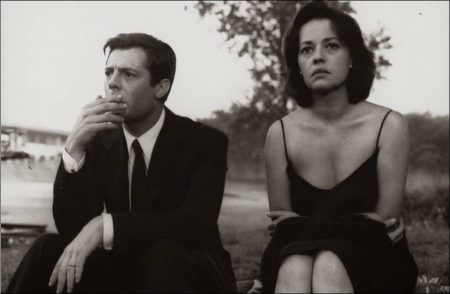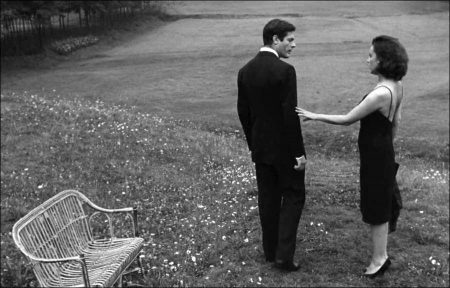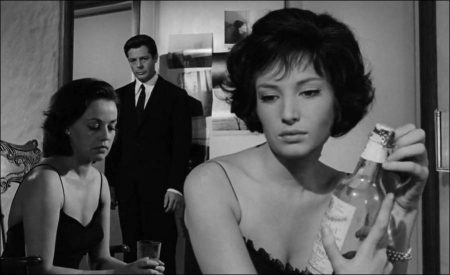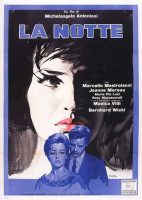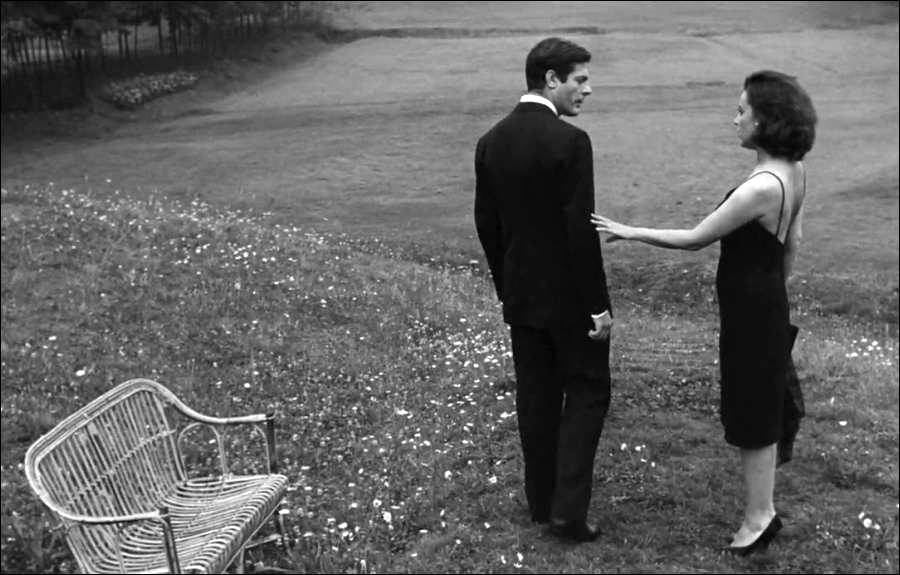La Notte movie storyline. Milan-based Giovanni and Lidia Pontano are solely going through the motions of being husband and wife. They have not explicitly stated their dissatisfaction with the marriage to each other beyond the odd snide comment, nor have they mentioned anything to friends or colleagues. However, there has been infidelity, if not in actuality then at least in intent. They still spend much of their time together out of habit, mostly out of their apartment to add some third party aspect to their lives.
A twenty-four hour period in their lives is presented. An early outing they have together this day is one that they both have some vested interested in beyond the sadness of the reason, namely to visit their terminally ill friend Tommaso Garani in the hospital, Tommaso a writer like Giovanni. But a couple of Giovanni and Lidia’s other joint outings are business ones, specifically to promote Giovanni’s just published novel, which is just the latest in a successful career.
Although several incidents this day will highlight the divide they are facing emotionally, it is the events of an evening garden party at the home of wealthy businessman Sig. Gherardini that may prove to be the most illuminating in showing Giovanni and Lidia’s marriage for what it is in its current state.
La Notte (English: “The Night”) is a 1961 Italian drama film directed by Michelangelo Antonioni and starring Marcello Mastroianni, Jeanne Moreau and Monica Vitti (with Umberto Eco appearing in a cameo). Filmed on location in Milan, the film is the relationship between a disillusioned novelist and his frustrated wife as it follows a single day and night where they confront their alienation from each other and the empty Milan circles they travel. The film continues Antonioni’s tradition of abandoning traditional storytelling in favor of visual composition, mood and character.
Grossing 470 million lire and receiving acclaimed for its exploration of modernist themes of isolation, La Notte received the Golden Bear at the Berlin International Film Festival (first time for Italian film), as well as the David di Donatello Award for Best Director in 1961. La Notte is considered the central film of a trilogy beginning with L’Avventura (1960) and ending with L’Eclisse (1962). It is one of Stanley Kubrick’s 10 favorite films and receives 4 votes from critics and 6 votes from directors in the Sight & Sound greatest films poll.
When La Notte was first released in Italy in 1960 the Committee for the Theatrical Review of the Italian Ministry of Cultural Heritage and Activities rated it as VM16: not suitable for children under 16.
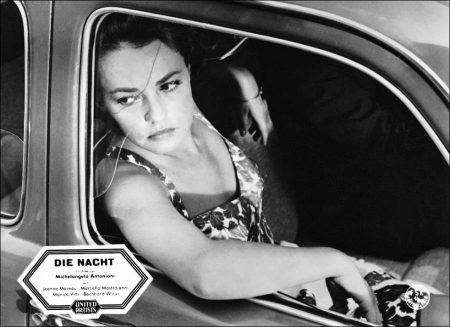
In addition, the committee imposed the following scenes be deleted:
1) the scene at the hospital with Mastroianni and the young lady must end at the moment when the two start to kiss each other;
2) the scene in the dressing room in which it is possible to see the naked breasts of Moreau;
3) the word “whore,” said by one of the two ladies walking in the park, must be removed;
4) the final scene in which Mastroianni and Moreau hug each other and start rolling down the grass, the scene can resume when the panning shot shows the landscape without displaying the two actors.Document N° 33395 signed on 2 November 1960 by Minister Renzo Helfer.
La Notte (1961)
Directed by: Michelangelo Antonioni
Starring: Marcello Mastroianni, Jeanne Moreau, Monica Vitti, Valentina Gherardini, Bernhard Wicki, Maria Pia Luzi, Rosy Mazzacurati, Guido A. Marsan, Vincenzo Corbella
Screenplay by: Michelangelo Antonioni, Ennio Flaiano, Tonino Guerra
Production Design by: Piero Zuffi
Cinematography by: Gianni Di Venanzo
Film Editing by: Eraldo Da Roma
Art Direction by: Mauro Bertinotti, Giuseppe Ranieri, Mario Solá
Music by: Giorgio Gaslini
MPAA Rating: None.
Distributed by: Dino de Laurentiis Distribuzione, United Artists, Lopert Pictures Corporation
Release Date: January 24, 1961 (Italy)
Views: 317
